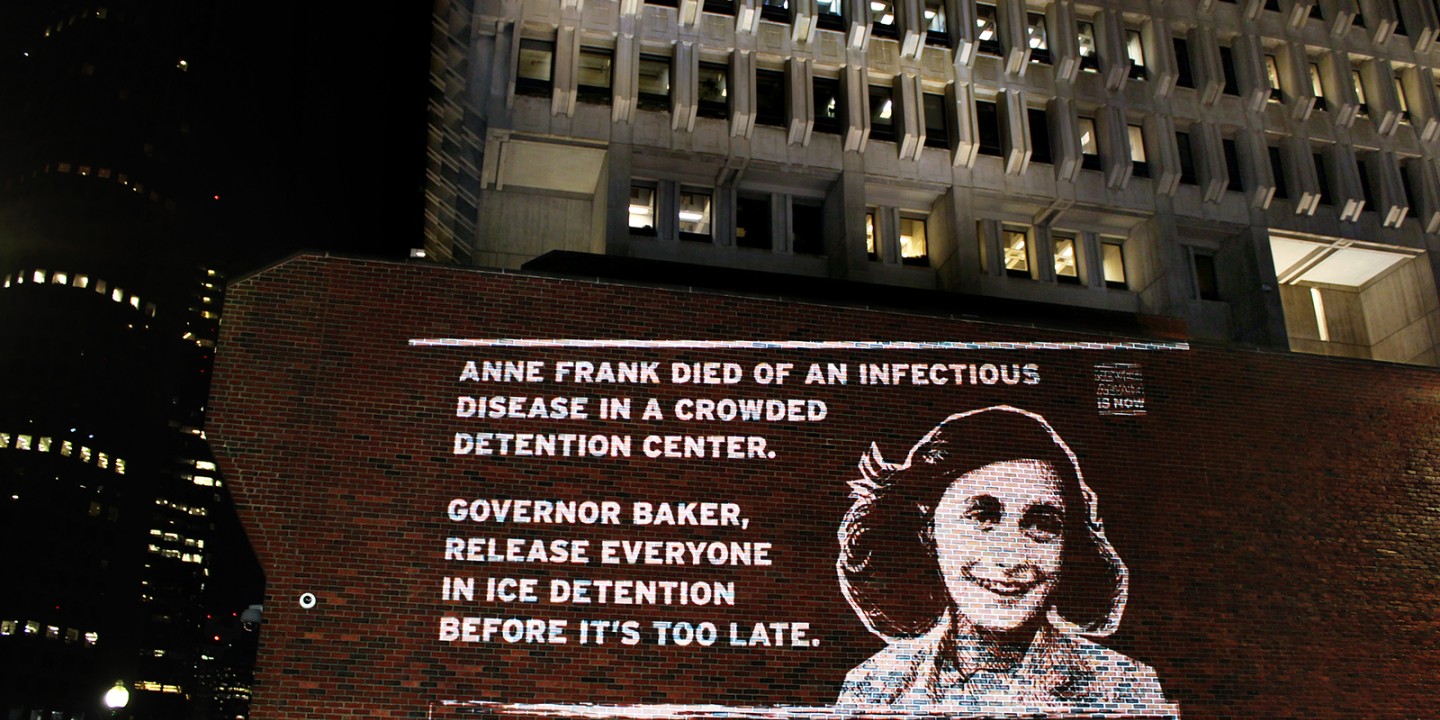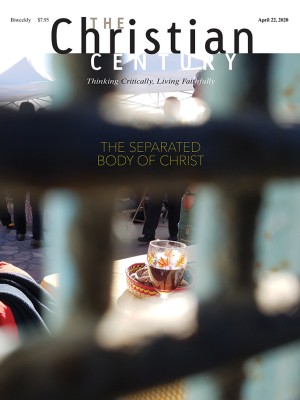‘Deadly as Dachau’: Activists call for mass decarceration during COVID-19 pandemic

If any locals still braving the streets walked past Boston’s John F. Kennedy Federal Building at the end of March, they may have found themselves staring at a huge black-and-white image of Anne Frank’s face.
“Anne Frank died of an infectious disease in a crowded detention center,” read the caption. The image was projected on a wall near the building, which houses the state’s federal immigration court, on March 22 by activists with the Jewish immigration group Never Again Action. “Governor Baker, release everyone in ICE detention before it’s too late.”
The demonstration was part of a nationwide push by progressive faith-based activists and religious leaders to release as many people held in jails, prisons, and immigration detention facilities as possible to protect them from outbreaks of the rapidly spreading coronavirus infection.
Read our latest issue or browse back issues.
“Governors can save hundreds of lives right now by releasing these detainees,” said Elizabeth Weinbloom, who helps lead Never Again Action’s Boston campaigns. “An outbreak at one of these facilities will make them as deadly as Dachau. Murderous intent is not required for a facility to become a death camp; inaction will have the same effect.”
About 2.3 million people are incarcerated nationally in local jails and state and federal prisons, according to the Prison Policy Initiative. Thousands have already been released by states and counties around the US, from Pennsylvania’s Mercer County to Ohio’s Cuyahoga County to Los Angeles County, following the guidance of public health and corrections officials to attempt to slow the spread of the coronavirus through the corrections system.
In a news conference last month, President Donald Trump also indicated that he would consider an executive order to release elderly nonviolent offenders in federal prison.
At a minimum, activists say, officials must release detainees who are over 50 years old, pregnant, have a compromised immune system, or are incarcerated on an unpaid money bond. They are also pushing to allow visits from clergy, attorneys, and family—at least 15 corrections systems have suspended all visitation—and to improve hygiene practices and access to medical care for any inmates who remain.
“Correctional facilities, including jails, represent the perfect breeding ground for COVID-19,” argued a coalition of more than 150 civil rights organizations in a letter to elected officials and law enforcement, pointing to the massive turnover of jailed populations, overcrowding, the high likelihood of chronic health conditions among detainees, difficulties in social distancing, inadequate hygiene, and lack of access to clean water, showers, and hand sanitizer that detainees face.
A slew of faith-based advocates representing multiple traditions signed onto the group’s statements, including the Union for Reform Judaism, T’ruah, the Tzedek Association, Bend the Arc, Believers Bail Out, Muslim Advocates, the National Council of Churches, American Friends Service Committee, Christian Reformed Church Office of Social Justice, the Church of Scientology National Affairs Office, Network Lobby for Catholic Social Justice, Lawndale Christian Legal Center, Faith in Action’s Live Free, and the New Sanctuary Coalition.
A separate immigration bond fund called Let My People Go, led by the New York Immigrant Freedom Fund, Jews for Racial and Economic Justice, Never Again Action, and the New Sanctuary Coalition, aims to release as many ICE detainees as possible before the coronavirus takes its toll.
On March 24, a 31-year-old Mexican national being held by ICE in New Jersey’s Bergen County Jail became the first detainee to test positive for the coronavirus at an ICE facility. Just days prior, a correctional officer tested positive at the same center.
In some of America’s largest prisons, inmates and correctional officers have already been confirmed to have the coronavirus, raising fears that it could take a deadly toll on inmates who cannot engage in social distancing, use hygiene best practices, or access comprehensive medical care.
In Chicago, faith leaders held a socially distanced prayer vigil outside Cook County Jail, seeking inmates’ release after a correctional officer who had worked in the facility tested positive for COVID-19. Two detainees, including one held in an area where the officer worked, later tested positive for the virus.
In a letter to New York governor Andrew Cuomo, 165 faith leaders urged state lawmakers not to overturn a pretrial reform law, which eliminated cash bail for nonviolent felonies and misdemeanors, due to backlash over a series of anti-Semitic incidents allegedly committed by people released under the new law.
Rolling back the reforms, faith leaders said, would increase pretrial incarceration and worsen the spread of COVID-19 in prisons.
“Our collective moral compass demands we choose people’s dignity over politics,” the groups wrote. “As faith leaders who have seen the value of these vital reforms firsthand, we now feel compelled to speak out against moral cowardice, and call upon our state’s leadership to stand with the community they claim to serve.” —Religion News Service






